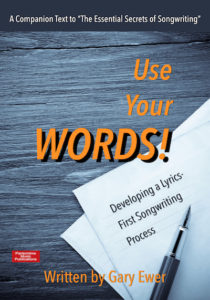In the Classical music realm, we tend to look to history as a way of categorizing music. The Baroque era, for instance, is generally identified as that period of time from about 1600 to 1750. We can clearly hear similarities between compositions written during that time: the way the writer uses the instruments, the approach to rhythm, melody and harmony, and so on.
Within that Baroque era, we can hear certain differences, but we mainly identify those dissimilarities as coming from various countries: there is a slight difference between Italian Baroque and German Baroque, for example.
 If you’ve struggled over getting your lyrics to sound right, read “Use Your Words! Developing a Lyrics-First Songwriting Process.” Right now, it’s FREE with your purchase of “The Essential Secrets of Songwriting” 10-eBook Bundle.
If you’ve struggled over getting your lyrics to sound right, read “Use Your Words! Developing a Lyrics-First Songwriting Process.” Right now, it’s FREE with your purchase of “The Essential Secrets of Songwriting” 10-eBook Bundle.
When we use the word “Classical”, we tend to use it as an large all-encompassing term – a genre, so to speak. The other words associated with that term — “Renaissance”, “Baroque”, “Romantic”, and so on — are typically seen as sub-genres of that larger “Classical” umbrella term.
There are some attempts to further categorize classical music, but certainly not as much as we see in the pop music world. For example, within the Romantic era, some writers were “programmatic” composers, writing music that strongly evoked images and stories. Other composers were “absolutists”, writing music that didn’t tell a story, but took a more “music for music’s sake” approach.
The fixation on genre is more of a pop music phenomenon. There are many hundreds of genres and sub-genres of musical styles, all co-existing, and most of which could be pulled in under the umbrella of “popular music.” Take a look at the list of genres on the “List of Musical Styles” Wikipedia page, and you’ll no doubt find some genres you’ve never even heard of before.
Does “Genre” Matter?
As a songwriter, does it really matter what genre you call your own? Should identifying the genre of your music be all that important?
I say mostly no. I actually can’t think of anything less important to a songwriter than being able to identify the particular sub-genre of their music. Having an idea of genre can be important for learning what’s being written in your realm, but as far as your songwriting technique is concerned, it’s not crucial knowledge.
The main reason it’s so unimportant is that , from a songwriting point of view, the differences between genres are largely differences in performance style, not composition style. Your latest song can probably be done as pop, country, calypso, ska, or reggae fusion. Or Baroque, Classical, or Romantic.
Even as a performing songwriter, I still submit that the actual genre of what you’re doing is not very important. Those interested strictly in the marketing of music (managers, producers, and other industry executives) will have an interest in targeting certain audiences, and genre suddenly becomes more important.
But if you want your songs to sound imaginative, fresh and stimulating to a listener, don’t worry so much about genre, and focus more on the technical aspect of good songwriting, which should transcend genre. Let other people who think it’s important decide which genre your songs fall into.
 Written by Gary Ewer. Follow Gary on Twitter
Written by Gary Ewer. Follow Gary on Twitter
 It’s time to declutter your songwriting process. “The Essential Secrets of Songwriting” eBook Bundle packages can help you become a more efficient, prolific songwriter. Get today’s 10-eBook Deluxe Bundle deal: a free copy of “Use Your Words! Developing a Lyrics-First Songwriting Process”
It’s time to declutter your songwriting process. “The Essential Secrets of Songwriting” eBook Bundle packages can help you become a more efficient, prolific songwriter. Get today’s 10-eBook Deluxe Bundle deal: a free copy of “Use Your Words! Developing a Lyrics-First Songwriting Process”










